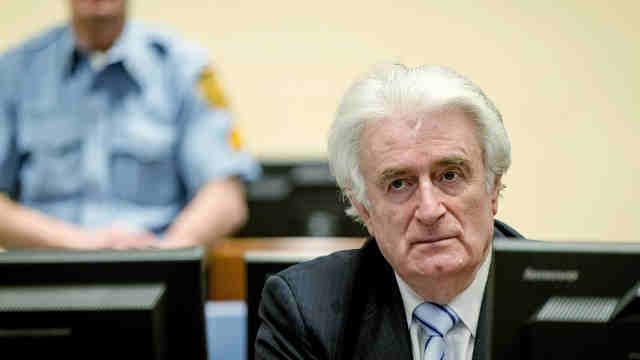SUMMARY
This is AI generated summarization, which may have errors. For context, always refer to the full article.

BELGRADE, Serbia (UPDATED) – Serbia and Russia on Friday, March 25 criticized the UN war crimes tribunal, alleging bias after it convicted wartime Bosnian Serb leader Radovan Karadzic of genocide.
Judges at the International Criminal Tribunal for the former Yugoslavia (ICTY) on Thursday, March 24 found the wartime Bosnian Serb leader guilty on 10 charges of genocide, war crimes and crimes against humanity for his role in Bosnia’s 1990s conflict.
While victims of Karadzic’s crimes said his 40-year jail sentence did not go far enough, both Moscow and Belgrade suggested the Hague-based court was biased against Serbs.
“All justice that leads to the conviction of one people for crimes that were committed by everyone is selective,” said Serbian Justice Minister Nikola Selakovic, reading out a statement following a government meeting on the verdict.
He said the work of the ICTY over the years had left a “bitter taste”.
Karadzic is the highest-profile figure to be convicted over the wars that tore Yugoslavia apart, with several others dying before they could face justice.
Many Serbs believe the court has unfairly targeted them.
“We have said for a long time that the activity of the International Criminal Tribunal for the former Yugoslavia is politicized,” said Russia’s deputy foreign minister Gennady Gatilov.
Asked if Karadzic’s conviction was also politicized, he answered “Yes,” Interfax news agency reported.
“Unfortunately all the cases that have been examined have been one-sided,” Gatilov said, adding the court did not examine “crimes by Kosovar leaders and the military”.
Close allies
Russian ally Serbia and Kosovo fought a war in the late 1990s and neither Moscow nor Belgrade recognize Kosovo’s declaration of independence in 2008, recognized by more than 10 countries.
In 2012, Russia also criticized the ICTY’s decision to clear two Croatian generals of war crimes.
Wartime Bosnian Serb leader Karadzic sentenced Thursday after being found guilty of genocide and other crimes during the 1992-95 war in Bosnia.
Moscow has also criticized NATO’s bombing of Yugoslavia, and on Friday said the UN judges at the tribunal “chose” to give the verdict against Karadzic on the 17th anniversary of the start of the bombing, on March 24 1999.
Russia’s foreign ministry said Karadzic’s sentence is “only the latest in the extremely harsh sentences to Serbs, carried out while other participants in the civil war in former Yugoslavia were acquitted.”
The widow of Serbian strongman Slobodan Milosevic, who died in 2006 while on trial for war crimes at The Hague, fled to Russia in 2003 while his retired diplomat brother also lived in Russia before his death in 2013.
Karadzic, 70, was convicted of genocide for the 1995 Srebrenica massacre in which almost 8,000 Muslim men and boys were killed and their bodies dumped in mass graves by Bosnian Serb forces.
Women in Srebrenica widowed by the slaughter slammed his sentence as “inadequate”.
But in Belgrade after the sentencing up to 5,000 ultranationalists chanted his name during a pre-election rally against the government, which also took aim at the tribunal.
At a memorial for victims of the 1999 bombing and again after the verdict, Serbian Prime Minister Aleksandar Vucic warned against attacks on Bosnia’s Serb entity, the Republika Srpska, which was founded by Karadzic.
Despite Serbia’s closeness to Russia, former ultranationalist Vucic has taken a firmly pro-European stance and is keen to lead Serbia into the EU.
Bosnia’s Muslim political leader, Bakir Izetbegovic, welcomed the verdict for Karadzic, while the United States said it closed “yet another painful chapter” in the story of the Yugoslav conflicts. – Jovan Matic, AFP/Rappler.com
Add a comment
How does this make you feel?
There are no comments yet. Add your comment to start the conversation.